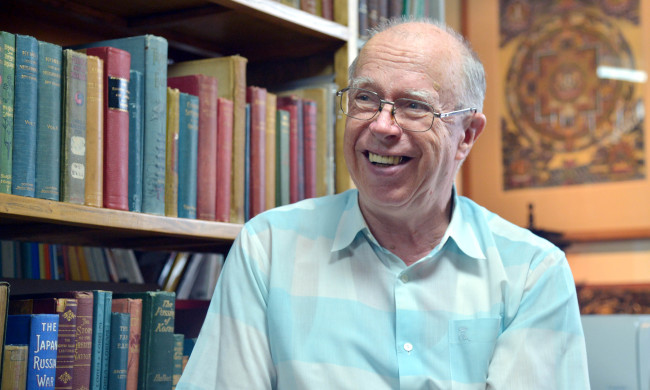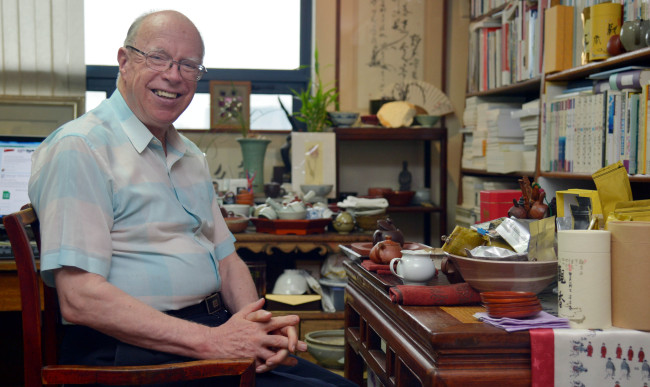The weather outside on this early August day is humid, the drizzling rain adding to the uncomfortable stickiness. Stepping inside the small office of Brother Anthony of Taize is like being transported to another place. The gentle scent of incense wafting in the air adds to the cool serenity of the space neatly crowded with bookcases.
At first, a member of a Christian ecumenical community burning incense strikes me as an odd combination, but I quickly correct myself. While I equate incense with Buddhist temples, the Catholic Mass also involves incense burning, I remember from my Catholic school days. “It is the most expensive kind,” says Brother Anthony when I ask what kind of incense he is burning.
He sits on a backless wooden bench placed in front of the computer desk: “The best for your back,” he explains. Like the simple bench, all the furniture in the office, set up like a cozy study, are austere and weathered; except for what looks like an old Chinese altar table, which is laden with a green-tea set, and the high-backed chair in front of it. Perhaps this is his one indulgence ― tea. But then again, making and drinking green tea has traditionally been closely associated with meditation.
Brother Anthony, originally from Cornwall, England, came to Korea in 1980 at the invitation of the late Cardinal Stephen Kim Sou-hwan. He had been working in a slum in Davao, the Philippines, for three years, after joining the Community of Taize, a French-based Christian ecumenical movement, in 1969. He was working with the poor, “just being there,” in his words, when the cardinal visiting the Philippines asked him to come to Korea.
 |
Brother Anthony of Taize sits at his office in Seoul. (Kim Myung-sub/The Korea Herald) |
“We had no idea what we would do in Korea,” Brother Anthony recalls. “We arrived on May 7, 1980, and you know what happened soon after,” he says. On May 17, a military coup took place, which was followed by the May 18 Democratic Uprising in Gwangju. Brother Anthony had arrived in Seoul to find a nation in great turmoil.
He set about learning Korean at Yonsei University and to earn a living, he began teaching French at Sogang University in September. After two to three years, the French department was founded and Brother Anthony, who had studied medieval English literature at Oxford University, moved to teaching general English. “I unexpectedly found myself a ‘gyosu’,” he says, using the Korean word for professor.
Brother Anthony, who has published 30 books of English translations of Korean poetry and fiction, embarked on translating Korean poetry in 1988. When he told a colleague that he would like to translate Korean poetry, he was introduced to the poet Ku Sang, whose works he has extensively translated. Brother Anthony is also well known for translating poems by Seo Jeong-ju and Ko Un, the perennial Korean favorite for a Nobel literature prize.
Noting that Seo and Ko are from the different ends of the political spectrum, Brother Anthony adds that at the time works by Ko, who took part in the pro-democracy movement, were banned from being translated.
The two poets may come from different ends of the political spectrum, but they shared the same religious influence: Buddhism. In fact, Ko was once a Buddhist monk. Poet Ku, on the other hand, was largely influenced by Christianity, although he also explored Buddhism. In this aspect, perhaps Brother Anthony’s work lies in the continuum of his religious life.
Brother Anthony’s Korean name, An Son-jae, was taken from a character in Ko’s “Little Pilgrim” who wanders through India, meeting 53 teachers. Also, “An Son-jae” sounds rather similar to Anthony pronounced in Korean.
Anyone who has translated literature knows the difficulties and the frustration of the translation process. “It is a hobby,” Brother Anthony says, but few would disagree that translating is rather like meditation ― involving meditating upon the original text and searching for just the right word, turn of phrase in the target language to deliver the meaning and nuance of the original.
In 2008, the government recognized Brother Anthony’s service, conferring him the Okkwan Order of Cultural Merit.
But why poetry, which is greatly waning in popularity, and not fiction?
“Back then, people were looking for meaning with beauty,” Brother Anthony says, referring to the popularity of poems back in the day. Most poems are short and more accessible, he adds. As for Korean fiction, “They are not interesting,” he says flatly.
He offers a broad critique of Korean fiction writers today. “The way Korean fiction writers write does not conform to the world trend,” he says. One reason for this may be that very few works of literature in foreign languages are available in Korean translations, he observes.
“In the outside world, fictions are entertaining,” he continues. “They engage the reader with multiple points of view, ambiguity.” On the other hand, “Korean readers are not accustomed to anything more than what you get on television soaps,” he says.
Then there is also the problem of translating Korean fiction. “The Land,” an epic, multivolume work by the late Park Kyung-ni, is notoriously difficult for non-Korean readers because the “cultural vocabulary” gets in the way, Brother Anthony explains. “Yi Mun-yeol’s ‘The Poet,’ which I translated, is not overloaded with detailed cultural vocabulary. It enjoyed great response because of its symbolic depth, dimension,” he says.
 |
Brother Anthony of Taize sits in front of an antique table holding a tea set. (Kim Myung-sub/The Korea Herald) |
The translator counts the Korean language as the most difficult aspect of his work. “I need to work with someone on translating Korean. I came to it at nearly 40,” says Brother Anthony. Things that are specific to Korean history and culture are also challenging.
Since his retirement from Sogang University in 2007, his daily routine has been to commute to the office from his home in Hwagok-dong where he lives in community with two other brothers: one works in prison ministry and with AIDS patients while the other is an artist.
The decision to become a naturalized Korean citizen in 1994 was a pragmatic one, according to Brother Anthony. “One thing leads to another,” he says, and after 12 years of dealing with the immigrations office, he thought why not.
Does he plan on returning home? “It is too late to start something new. This is where my life is for the moment,” says the 72-year-old Brother Anthony.
By Kim Hoo-ran, Editorial writer
(
khooran@heraldcorp.com)









